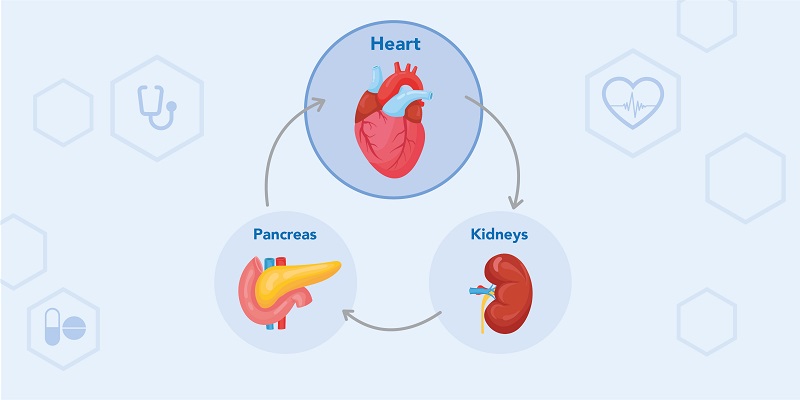Diabetes Type 2 and CVRM
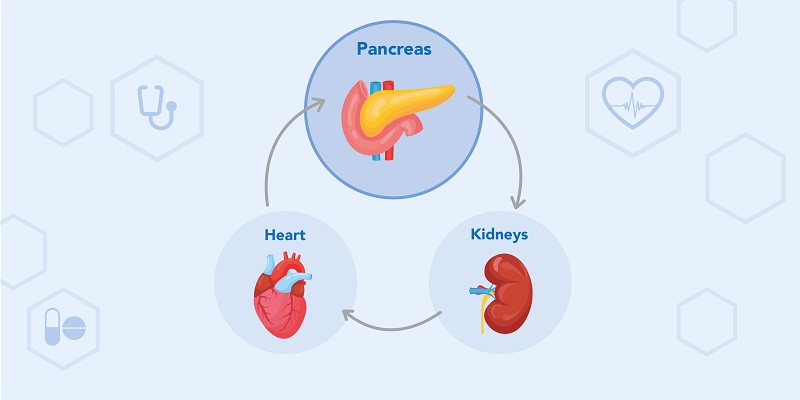
Worldwide, over 500 million adults, which is one in 10, are living with diabetes. This condition has important links with both heart and kidney disease – a disease cluster called “CVRM”. Learn how these conditions are interconnected and how best to combat them for great overall health.1
WHAT IS CVRM?
Each organ of the body performs a specific task, but also depends on the other organs to function well. When one part isn’t working properly, it places stress on the others, negatively affecting your health as a whole.
An important example of this interconnection is how the heart, kidneys and pancreas affect one another, and the corresponding links between cardiovascular disease, chronic kidney disease and Type 2 diabetes.
These organ systems can be collectively termed “CVRM”:
CV: Cardiovascular refers to the circulatory system – the heart and blood vessels.
R: Renal refers to the kidneys, which can develop chronic kidney disease (CKD). With CKD, the kidneys can’t properly perform their function of removing waste and toxins from the blood.
M: Metabolic refers to the pancreas, which produces enzymes and hormones, notably insulin, that help break down food and control blood sugar levels. Type 2 diabetes is the most common associated condition.2,3
What is type 2 diabetes?
In Type 2 diabetes, blood sugar levels rise above normal. The food we consume breaks down into glucose, a simple sugar, which circulates in our bloodstream. The pancreas secretes the hormone insulin to help transform glucose into energy that the body’s cells can utilise. However, in the case of Type 2 diabetes, the body either produces insufficient insulin or struggles to use its insulin effectively. This leads to difficulties in processing glucose, causing an unhealthy accumulation of sugar in the bloodstream. Elevated blood sugar levels can harm both the major vessels serving the heart, brain and legs, as well as the smaller ones impacting the eyes, kidneys, nerves and feet.4,5
Causes and risk factors
Certain lifestyle factors raise your risk of developing type 2 diabetes, including unhealthy diet, obesity, sedentary lifestyle and smoking.
Diabetes also has a genetic component: if you have family members with diabetes, you have increased risk of also developing the condition.
Type 2 diabetes is associated with ageing – older people are more likely to have problems with their pancreas.6
Symptoms
Diagnosing diabetes based solely on symptoms can be challenging, as these might not be readily apparent, particularly in the initial stages of the condition. Later symptoms may include:
- Frequent urination
- Unintentional weight loss
- Fatigue
- Increased thirst
- Blurred vision
- Slow wound healing
- Numbness or tingling in hands and feet.5

Diagnosis
Should you exhibit symptoms of diabetes, your physician will assess your blood sugar levels through a blood test. However, it’s advisable not to wait for symptoms to show up. Everyone aged 35 and above should undergo blood glucose testing, and those with risk factors for diabetes, such as obesity, should begin even earlier.It’s far better to know if you have diabetes because the sooner you start treatment, the better the outcome.5,7
Treatment
A diabetes treatment plan usually includes medication, home blood sugar monitoring and healthy lifestyle changes.
Common medications include:
- Glucagon-like peptide-1 receptor agonists (GLP-1 RAs), and sodium-glucose co-transporter-2 inhibitors (SGLT2), which help the kidneys remove excess glucose via the urine.
- Metformin – reduces blood glucose, helps your own insulin work more effectively.
- Insulin – supplements your body’s insulin to help lower blood sugar.
- Dipeptidyl peptidase-4 (DPP-4) inhibitors – control insulin and glucose levels by blocking specific enzymes.6
You may experience incidents of low blood sugar (hypoglycaemia) after starting on diabetic medication, so it’s important to carry a glucose-containing snack. Ask your doctor about recognising and managing hypoglycaemia.5
Links between diabetes and cardiovascular disease
Three common diseases of lifestyle – diabetes, cardiovascular disease and chronic kidney disease (CKD) – are interconnected. When you have dysfunction in one of these areas, it can put stress on the others and cause problems there also.
There is a strong link between high blood sugar and cardiovascular disease. If your blood sugar isn’t well controlled and remains high, it can damage blood vessels and nerves in your heart. When your heart isn’t functioning at its best, it elevates your risk for ailments like heart attacks and strokes. Individuals with type 2 diabetes are approximately twice as susceptible to these cardiovascular incidents. Furthermore, these events are often more severe and tend to occur at a relatively younger age.
However, the close connection between type 2 diabetes and the heart means that if you undergo appropriate treatment and lifestyle changes that improve the health of one of these organ systems, you will likely also improve the health of the other.2,6
Links between diabetes and kidney disease
People with type 2 diabetes frequently experience kidney problems if their blood sugar level is poorly controlled. High blood sugar levels can significantly damage your kidneys, making them less efficient.
Type 2 diabetes can also contribute to high blood pressure, a major cause of CKD. Doctors often prescribe treatment to help control blood pressure alongside those to control blood sugar, to protect the kidneys.
Getting diabetes under control can have a positive impact on the kidneys, given the close connection between these organ systems.6
Take charge of your health
Being diagnosed with type 2 diabetes and needing to make lifestyle changes may feel daunting initially. Start with small, manageable changes and you’ll soon adapt to a healthy routine.
These actions help to lower the risk both for developing diabetes, and for further damage if you are already diagnosed:
- Schedule regular medical checkups for ongoing treatment, monitoring and guidance on managing your diabetes, as well as related issues such as cardiovascular disease. Plaque can build up “silently” in your blood vessels for years, so it’s recommended that cardiovascular risk factors are assessed at least annually.
- Take medications as prescribed, so they work effectively.
- Stop smoking. Smokers are 30%-40% more likely to develop type 2 diabetes than non-smokers. People with diabetes who smoke are more likely to have difficulty with insulin dosing and blood sugar management.
- Get regular exercise. Choose a physical activity you enjoy, and gradually increase to at least 150 minutes cardio per week, plus strength training twice weekly. Activities like walking, housework and gardening count too. Take the stairs, weed the beds, dance in your living room – it all adds up. Blood sugar monitoring before, during and after exercise sessions may be necessary, especially if you’re on insulin – check with your doctor.
- Follow a healthy diet recommended by your doctor or nutritionist: high in fruit and vegetables, whole grains and lean protein; low in processed food, added sugar and salt. Also aim to maintain a healthy weight. Dietary tips:
- Beware of hidden sugar in drinks and baked goods.
- Retire the salt shaker – make food tasty with salt alternatives, herbs and spices.
- Instead of animal fats like butter, use healthier vegetable oils (in moderation). Eat fish, seeds and nuts containing heart-healthy fats.
- Swap refined white flour, rice and pasta for high-fibre whole grains.
- Get support from friends, family and the patient community, and ask your doctor to recommend a therapist if you’re feeling overwhelmed or down – especially for longer than two weeks. Make contact with Diabetes South Africa https://www.diabetessa.org.za/ for a wealth of information and resources, including support groups near you or online.6,9,10,11,12
Related Brochures
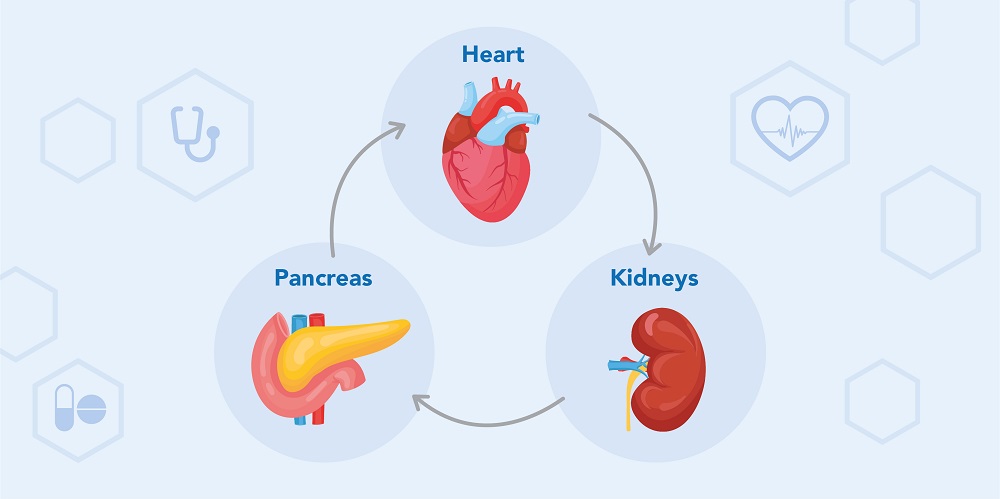
what-is-cvrm
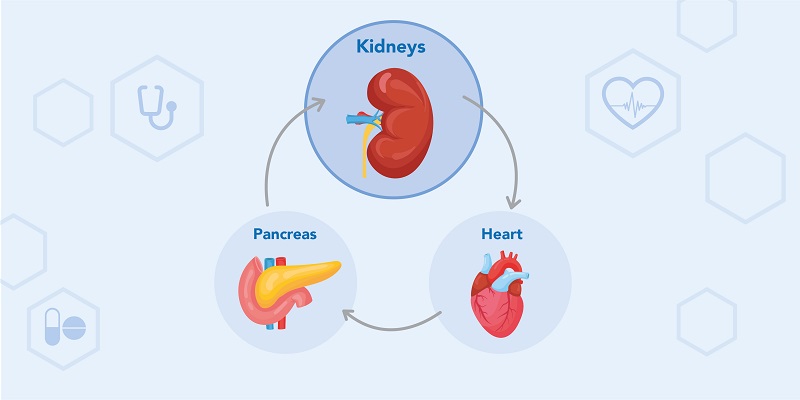
chronic-kidney-disease-and-cvrm
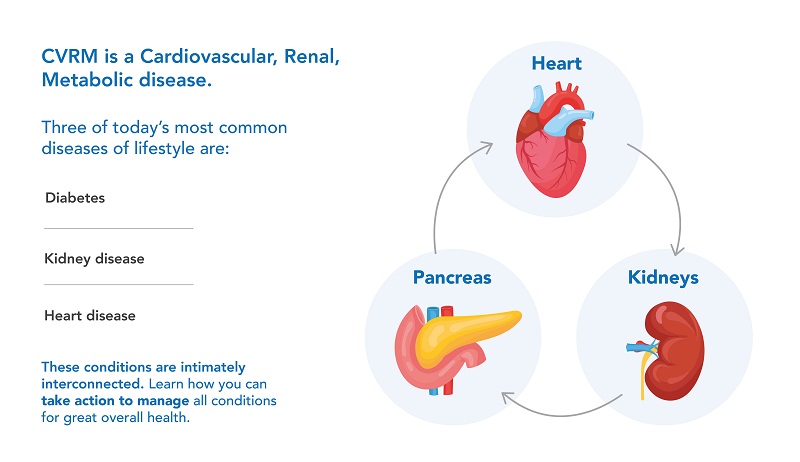
cardiovascular-disease-and-cvrm
